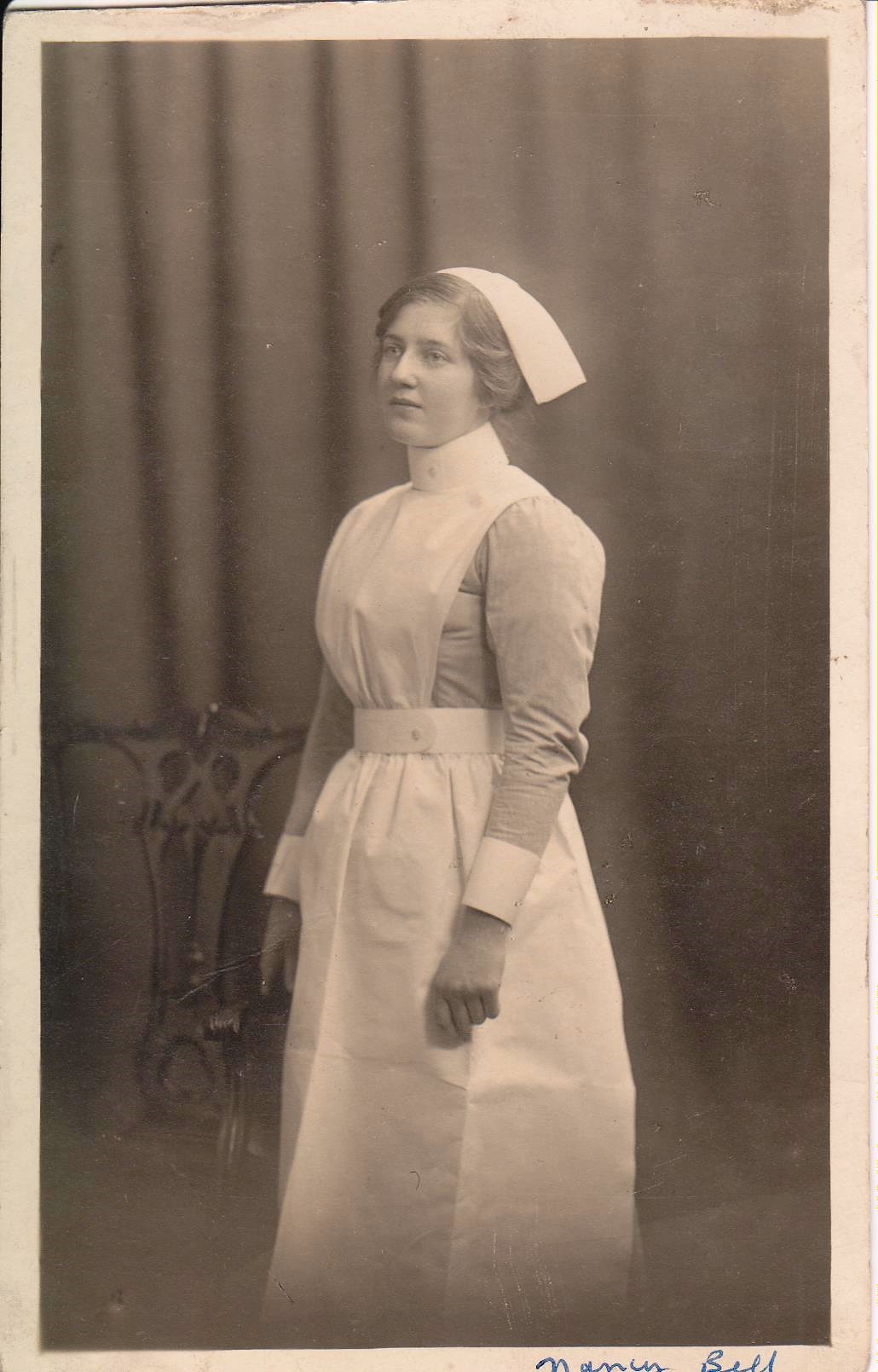
Story submitted by Mrs Drury, a resident of Richmond.
Nancy Bainbridge was born in Weardale, County Durham in May 1894. She was one of eight children whose parents were hardy hill farmers. Nancy was a very practical person and joined Queen Alexandra’s Imperial Military Nursing Service in 1914.
Nancy served at a military hospital in East Anglia where the nurses received casualties straight from the Somme. Her upbringing on a farm had afforded her some preparation for the ensuing, distressing sights and sounds. She described how the men arrived with mud and tufts of grass in their wounds. The nurses found out the hard way that soldiers’ skin, subjected to the mustard gas attacks in the trenches, could not be washed with water as that inflicted pain. Nancy received many deathbed requests.
After the war Nancy worked as a private nurse in families with disabled soldiers and patients with other conditions. She married Captain Jack (John Adam) Bell.
Nancy had a brother William, also a hill farmer and ten years older. He joined the Northumberland Fusiliers, but saw little service because, when detailed to chop an officer some sticks, a splinter blinded him in one eye.
Another sibling, Violet, worked in Barnard Castle’s recruiting office. Her soldier husband Harry Raine was awarded the Military Cross. The medal was presented to the Bowes Museum, Barnard Castle.

Explore more memories from the ribbon
-
Sister Kate Luard
Sister Katherine (Kate) Evelyn Luard Kate was born in Averley Essex on the 29th June 1872, the daughter of the vicar and the tenth of thirteen children. Her childhood was spent at Aveley Vicarage and then Birch Rectory near Colchester. Between 1887 and 1890 she attended Croydon High School for Girls. Her headmistress and school founder, Dorinda Neligan, had been a nurse in the Franco-Prussian war of 1870/1, as well as being a suffragette and campaigner for women’s rights. She may well have been the inspiration for Katherine’s desire to go into nursing. On leaving school Kate took various jobs to earn money to train as a nurse. This she did at Kings College Hospital in London. In 1900 she served with the Army Nursing Service for two years in South Africa during the 2nd Boer War of 1899-1902. Following nursing work at home, on the 6th August 1914, aged 42, Kate enlisted in the Queen Alexandra’s Imperial Military Nursing Service Reserve. Kate served in France until 1918, firstly on ambulance trains then at Casualty Clearing Stations. She was awarded the Royal Red Cross and Bar, and was twice mentioned in dispatches for gallant and distinguished service in the field. Her various letters to her family at home were published in two books: ‘Diary of a Nursing Sister on the Western Front 1914-15’, published anonymously in 1915, and ‘Unknown Warriors: The Letters of Kate Luard RRC and Bar, Nursing Sister in France 1914-1918’ first published in 1930. Kate never married…
-
Thomas Holman
Thomas Holman, great-grandfather of Carl Watts, the Green Howard Museum’s Learning Officer, worked as a boiler maker at the Wellington Foundry in Lincoln. At the outbreak of war the company which owned the foundry, Fosters, converted production from agricultural vehicles to war machinery. It was here that the first tanks were developed under the management of William Tritton. Secrecy was of the utmost importance, and the original code name for the revolutionary new vehicle was ‘The water-carrier for Mesopotamia and Russia’. Bill Rigby, chief draughtsman and designer recounted in the mid-1980s that eventually a group of the boiler makers came to is office, fed up with the long winded code name. Their suggestion that it should just be referred to as ‘the bl**dy tank!’ has stuck with the vehicle and its successors ever since. Thomas Holman is pictured with colleagues back row, third from the left in front of ‘Lurcher’ a Mark IV male tank in November 1917. His brother George Edward Holman served with the 6th battalion Lincolnshire Regiment at Gallipoli, Egypt and France. The efforts of the brothers were combined on 15 September 1916, as 6th Lincs were at the Battle of Flers Courcelette – the first battle to see the use of the tank.
-
Ernest John Tyler
Deirdre Tyler of Richmond explained the story of Ernest (Ernie) John Tyler to us at one of our drop-in days. Ernie was born on 23 April 1880 in Edmonton, London. He served in the Royal Engineers 1914-1919, mainly with 29 Division and saw active service in the Dardanelles and the Somme. He embarked for his first active service on 2 June 1915. He was one of the few Royal Engineers aboard the “S.S. River Clyde” in 1915, when it was ill-fatedly beached at “V” beach, Cape Helles, Gallipoli, under the guns of the defenders. Six VC’s were subsequently awarded to the ship’s crew for their courage in maintaining the bridge and rescuing the wounded from the beach. Ernie subsequently spent time in Egypt and then at the Home Depot. He suffered from typhoid or enteric fever and as a result was granted home furlough from 29 February to 19 April 1916. He also caught malaria, being classed B,ii for six months as a result. He was awarded a Good Conduct Badge on 18 June 1917. Ernie lost two of his brothers in the Great War, one at Gallipoli, and another at sea. After the First World War, Ernie returned to his work in the postal service and was in charge of the first telegraph message motor cycle delivery riders. He had six children who survived into adulthood. Five served their country in the forces; four in the second world war and one post war. Bernard, his eldest son, was killed…
